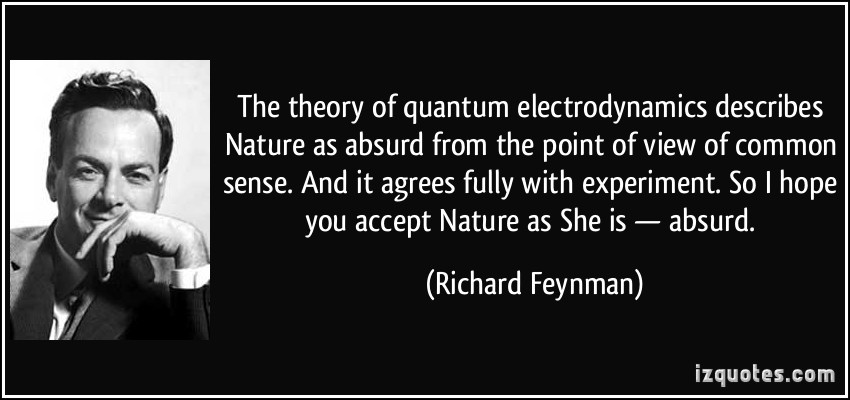Yeah, we get Google here too. If you can’t answer my questions, then you can’t assess whether Behe is persuasive, much less right.
I guess you don’t have to speculate, then. But it seems to me that you are then in the position of saying that ‘design’ isn’t a meaningful word or a concept worth discussing. I disagree.
I thought that by writing “may bring” he was signaling an opinion and/or a speculation, not a conclusion.
I’m sorry you didn’t like the piece. Like I said, I’m an unbeliever and a pretty hardcore materialist, but I think design is real and I think Ratzsch points to broad swaths of conceptual ground that thinking people can agree on. Contrast his thought with the silly defense of Behe that permeates this thread, or even just contrast it with Behe’s entire corpus of work. I think you might be missing an opportunity, as a believer, if you would dismiss Ratzsch. But that’s just my opinion, and Del was a good friend, so I must confess my own bias and then let you have the last word.
I have tried to make this point clear to various people without success, but perhaps you and I may arrive at a clear statement.
I view theology as ultimately based on Biblical sources. If a theology is presented that uses, or seeks to ‘mold’ its notion on other sources (eg evolution), then that theology must find a way of meeting the standards of orthodoxy, which ultimately must be grounded in Biblical teaching.
If the ‘molding’, or ‘mixing’, involves inadequate sources, then that theological notion must be inadequate and in error. Instead I would view such a notion as speculation and novelty, and treat it with great scepticism.
This is an attempt at clarification - by all means examine my statement and improve on it ![]() .
.
It’s probably just me as a physicist who thinks kind of like this:
Design feels like ‘common sense’ to me in this quote, but I think that I could use some broader perspectives from other disciplines.
The language is tough for me to swallow in the first place even with ‘may bring.’ I still need to figure out how a ‘design theory’ helps me understand the natural world any better.
Variation is not done by breaking or damaging of genes. Genetic change happens many positive ways as God creates new creatures to live in God’s changing Creation.
Matthew, the problem with your Feynman quote is that we humans do not live in the quantum world. We live in the natural world, which is not absurd, which is predictable.
Even the quantum world seems to be predictable, so how can it be absurd? The quantum world obeys its own rules, and the natural world obeys its ownrules, so really neither is absurd, because absurdity obeys no rules. The quantum world is the backdrop for the natural world, which is not determined by the quantum world as some believe.
@pevaquark
Matthew, Please reopen so I can respond to you. I was in conference for the last 4 days.
Thank you,
Roger
@pevaquark Matthew > “I meant ‘absurd’ as in opposed to common sense.”
Unfortunately we cannot make our own definitions of what words mean. Absurd means that things make no sense, including scientific sense, not that things seem to violate “common sense.”
There are three examples of scientific discoveries that that violate traditional thinking, but are not absurd. The first is that the earth stands still and the sun, the planets, and the stars move around it. The was not based only on the basis of experience, that humans do not feel the earth move, but so observe other physical bodies move, but also the “science” of Ptolemy and the philosophy of Aristotle. It was only when humans were able to use telescopes to better observe the heavens that the theory of Copernicus could be confirmed. Good science eclipsed bas science.
Creationism is based on the view that God created the universe and all that is with in in six days. It has soothing to do with intuition. Evolution takes form when humans found that the earth and its flora and fauna took shapes over millions of years. Human thinking takes time to change, especially then it seems to contradict the Bible, and traditional logic that excludes change and transitional fossils.
As for quantum physics, as I have said, the quantum world is different from the macroworld, which means it has its own laws. These laws are consistent as determined by scientific experiment, so we can not call this world absurd. They are just different.
Different is not absurd. Different requires an explanation. Absurd defies an explanation. Some people want the world to be absurd because they are too intellectually lazy to seek an explanation.
I meant ‘absurd’ as in opposed to common sense. @DennisVenema wrote:
Humans are not well suited to have “common sense” (or to use Axe’s term, “common science”) intuitions about phenomena that are outside our range of everyday experiences. We simply do not have the mental tools to intuit what might happen geologically over millions of years, what principles might be in play at speeds close to the speed of light, and so on. Quantum mechanics, to this non-specialist, looks like a violation of basic reason, but my colleagues in physics tell me that my intuitions are not valid. Similarly, what a process of evolution over billions of years might (or might not) be able to accomplish needs to be adjudicated based on evidence, not intuition.
Source: https://henrycenter.tiu.edu/2018/02/intuitions-proteins-and-evangelicals-a-response-to-undeniable/
This topic was automatically closed 3 days after the last reply. New replies are no longer allowed.
